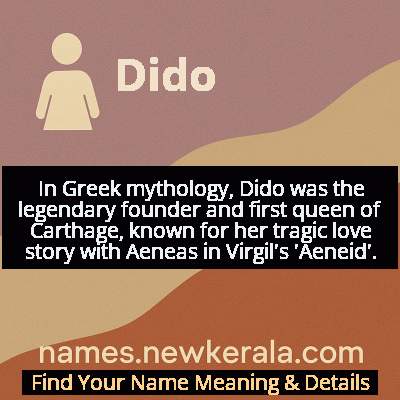Dido Name Meaning & Details
Origin, Popularity, Numerology Analysis & Name Meaning of Dido
Discover the origin, meaning, and cultural significance of the name DIDO. Delve into its historical roots and explore the lasting impact it has had on communities and traditions.
Name
Dido
Gender
Female
Origin
Greek
Lucky Number
5
Meaning of the Name - Dido
In Greek mythology, Dido was the legendary founder and first queen of Carthage, known for her tragic love story with Aeneas in Virgil's 'Aeneid'.
Dido - Complete Numerology Analysis
Your Numerology Number
Based on Pythagorean Numerology System
Ruling Planet
Mercury
Positive Nature
Adventurous, dynamic, curious, and social.
Negative Traits
Restless, impatient, inconsistent, prone to indulgence.
Lucky Colours
Green, white.
Lucky Days
Wednesday.
Lucky Stones
Emerald.
Harmony Numbers
1, 3, 9.
Best Suited Professions
Sales, marketing, travel, entertainment.
What People Like About You
Versatility, charisma, adventurous spirit.
Famous People Named Dido
Dido (Queen of Carthage)
Mythological Queen
Legendary founder and first queen of Carthage, central figure in Virgil's Aeneid
Dido (Florian Cloud de Bounevialle Armstrong)
Singer-Songwriter
British singer-songwriter known for hits like 'White Flag' and 'Thank You', sold over 40 million albums worldwide
Dido Elizabeth Belle
Historical Figure
Mixed-race British aristocrat who challenged racial conventions of her time, subject of 2013 film 'Belle'
Name Variations & International Equivalents
Click on blue names to explore their detailed meanings. Gray names with will be available soon.
Cultural & Historical Significance
Beyond classical literature, Dido's legacy extends through art, opera, and modern reinterpretations. Christopher Marlowe's play 'Dido, Queen of Carthage' and numerous operatic works by composers like Purcell have kept her story alive. The name symbolizes both the creative power of founding civilizations and the destructive potential of passionate love. In contemporary contexts, Dido represents complex female leadership - a ruler capable of building a great city yet vulnerable to emotional devastation. Her suicide by self-immolation upon Aeneas's departure has made her an enduring symbol of tragic love and the price of betrayal.
Extended Personality Analysis
Individuals named Dido are often perceived as possessing a complex blend of strength and sensitivity, reflecting their namesake's dual nature as both a powerful ruler and a passionate lover. They typically exhibit strong leadership qualities, organizational skills, and the ability to build and maintain complex systems - whether in their personal relationships, careers, or creative endeavors. Like the mythological queen who founded Carthage, modern Didos often demonstrate remarkable resilience and the capacity to create something meaningful from challenging circumstances. They tend to be visionary thinkers with a strong sense of purpose and determination.
However, the Dido personality also carries the mythological queen's emotional depth and capacity for intense passion. These individuals often experience emotions profoundly and may struggle with balancing their practical ambitions with their romantic ideals. They can be fiercely loyal and devoted in relationships, sometimes to their own detriment. The tragic aspect of the name suggests a potential for dramatic emotional responses when betrayed or disappointed. Yet this emotional intensity also fuels their creativity and artistic expression, making many Didos particularly gifted in artistic, musical, or literary pursuits. They often possess a magnetic charisma that draws others to them, combined with an underlying vulnerability that makes them both compelling and relatable.
Modern Usage & Popularity
In contemporary usage, the name Dido maintains a distinctive and somewhat unconventional presence. While never achieving widespread popularity, it has experienced periodic resurgences, particularly following the success of British singer Dido in the early 2000s. The name appeals to parents seeking mythological names with strong female associations that are recognizable yet uncommon. Current usage trends show it as a choice for parents interested in classical education, literature, or unique names with historical depth. It ranks outside the top 1000 names in most English-speaking countries, preserving its exclusive quality. The name finds particular favor among families with interests in ancient history, classical literature, or those seeking names that balance strength and femininity. Its relative rarity makes it an attractive option for parents wanting a distinctive name that nevertheless carries substantial cultural and historical weight.
Symbolic & Spiritual Meanings
Symbolically, Dido represents the complex interplay between creation and destruction, love and loss, leadership and vulnerability. As the founder of Carthage, she embodies the archetype of the city-builder and civilization-creator - a symbol of organizational genius, strategic planning, and the ability to transform wilderness into ordered society. Her tragic love story with Aeneas makes her an enduring symbol of abandoned love and the destructive power of passion. The pyre on which she dies represents both purification through fire and the ultimate sacrifice for love and honor. Metaphorically, Dido signifies the tension between public duty and private desire, between the demands of statecraft and the longing for personal fulfillment. Her story serves as a cautionary tale about the costs of empire and the personal sacrifices required by leadership. In psychological terms, she represents the anima figure - the embodiment of feminine creative power that can both build civilizations and destroy itself through unchecked emotion.

